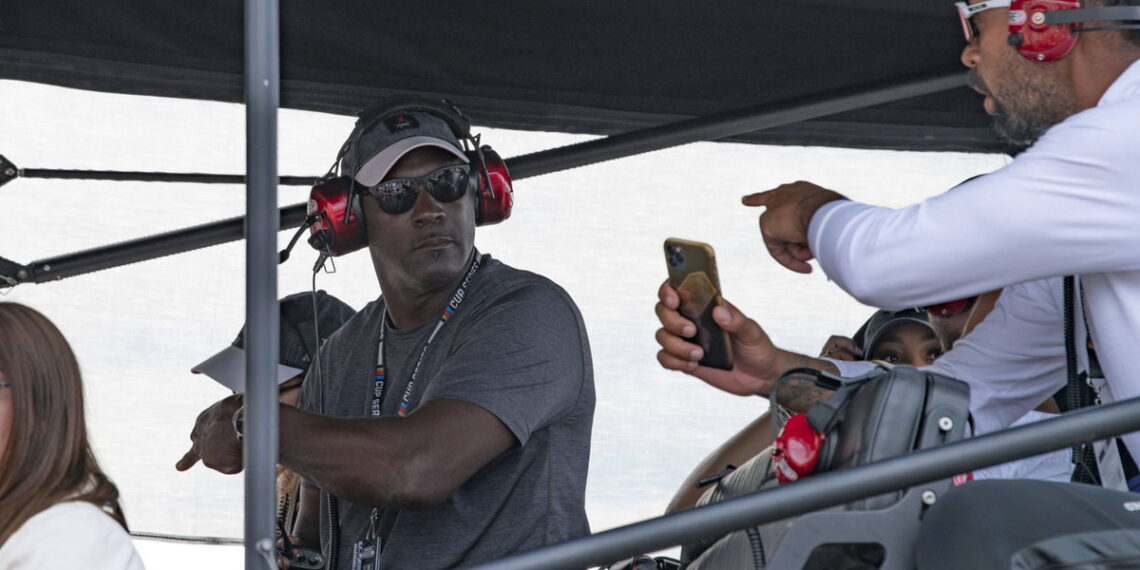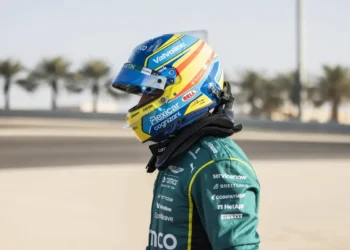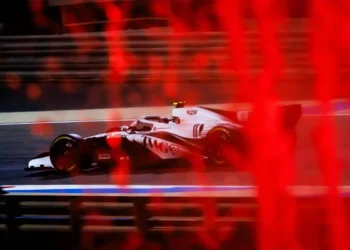NASCAR’s Dark Side: Shocking Revelations of Sabotage Against Rival SRX!
In a jaw-dropping twist in the NASCAR saga, explosive emails and text messages have surfaced, revealing the high-stakes drama behind the scenes as the 23XI Racing and Front Row Motorsports prepare for a fiery antitrust lawsuit against NASCAR. The trial, set to kick off on December 1, has unearthed a treasure trove of evidence, including a chilling directive from NASCAR’s top brass: “Put a knife into this trash series,” referring to the Superstar Racing Experience (SRX) as tensions flared over Denny Hamlin’s participation in its upcoming season opener.
The SRX, founded by racing legends Tony Stewart and Ray Evernham, was gaining momentum as it prepared for its third season, boasting a new partnership with ESPN after two successful years on CBS. But the NASCAR leadership was not amused. With Hamlin’s unexpected decision to join SRX, NASCAR officials felt threatened. The organization’s then-president, Steve Phelps, and COO Steve O’Donnell exchanged messages that laid bare their disdain. Phelps bluntly stated, “These guys are just plain stupid,” while O’Donnell urged immediate legal action to combat the perceived threat.
The emails paint a picture of a desperate NASCAR, fearing that SRX’s rising popularity and the engagement of current Cup Series drivers would infringe upon its market. Just the previous summer, Trackhouse Racing owner Justin Marks had stirred the pot by racing in SRX, prompting further concerns among NASCAR executives about the competition encroaching on their turf. O’Donnell lamented, “They just don’t get it,” suggesting that drivers like Marks and Chase Elliott were jeopardizing the integrity of NASCAR by racing in a rival series that was stealing their spotlight.
The tension escalated as O’Donnell pointed out that the drivers involved, including Stewart and the legendary Michael Waltrip, were undermining their own careers for mere cash. He remarked, “This is exhibit ‘a’ that nobody gives a shit about what got them their careers.” The implications were clear: NASCAR felt betrayed by its own stars, who were willing to risk their reputations for a chance at a different racing experience.
Discussions turned to the future and the potential for Dale Earnhardt Jr. to join SRX, which could spell disaster for NASCAR if not handled correctly. The executives shared their fears: “Wait until Jr. says he is running an event. Matter of time.” The stakes were high; if NASCAR didn’t act decisively, it could lose its grip on both legacy and fan engagement to SRX, which had already shown it could outshine NASCAR’s own events in terms of viewership.
The conversations revealed an organization grappling with its identity and the fear of losing its dominance in the racing world. Phelps warned, “This could turn into LIV if we don’t play our cards right.” The reference to LIV Golf, a rival league that disrupted the traditional golfing landscape, underscored the gravity of the situation. NASCAR leaders recognized that it was a battle not just for fans, but for the very essence of what stock car racing represented.
As the trial approaches, the revelations from this unsealed cache of messages paint a daunting picture of NASCAR’s inner workings and its reaction to a burgeoning competitor. With SRX not returning for a fourth season and its physical assets being sold off, the future of racing as we know it hangs in the balance. As fans and stakeholders watch closely, the question remains: Can NASCAR adapt to a changing landscape, or will it succumb to the very forces it seeks to suppress?
This unfolding drama is not just about racing; it’s about power, legacy, and the fierce competition that drives the adrenaline-fueled world of motorsport. Buckle up, because the NASCAR landscape is shifting, and the fallout from this lawsuit could redefine racing as we know it!










